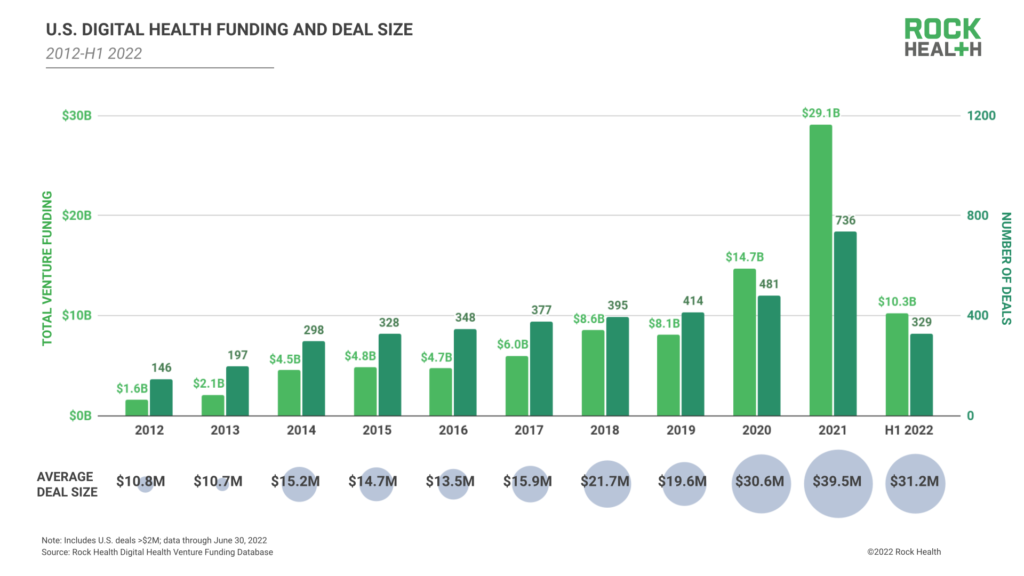 Digital health exploded during the height of the pandemic out of sheer necessity, but the question was always going to be: what would happen once the pandemic waned and things went back to some semblance of normal.
Digital health exploded during the height of the pandemic out of sheer necessity, but the question was always going to be: what would happen once the pandemic waned and things went back to some semblance of normal.
There were already signs of a slowdown in digital health in Q1, with both money and deals dropping from the end of 2021. Now, new data put out by Rock Health confirms that the pandemic highs are likely a thing of the past, though the number will likely remain higher than they were pre-COVID.
There was $4.1 billion invested in digital health in Q2 of this year, which represents a 33% quarter-to-quarter drop from $6.1 billion in Q1 2022, and a 51% year-to-year drop from $8.3 billion in Q2 2021. It’s also the lowest amount invested in two years, since the $2.9 billion raised in Q2 2020.
This brings the total invested in the first half of 2022 to $10.3 billion, putting it on track to total $21 billion by the end of the year. While that would be a drop of 28% from the $29.1 billion raised in 2021, it would still be the second largest year ever for digital health, 43% higher than the $14.7 billion raised in 2020.  In terms of deals, 2022 is slightly lagging behind 2021: with 141 deals in Q2, which is down 25% quarter-to-quarter, there were a total of 329 through the first half of the year. That equals 44% of the 736 deals made through all of 2021, and puts the year on pace for 658 total, which would be a 10% year-to-year.
In terms of deals, 2022 is slightly lagging behind 2021: with 141 deals in Q2, which is down 25% quarter-to-quarter, there were a total of 329 through the first half of the year. That equals 44% of the 736 deals made through all of 2021, and puts the year on pace for 658 total, which would be a 10% year-to-year.
While things are starting to slow, there are reasons to be optimistic, Rock Health noted in the report, including the fact that venture investors raised record funds last year, giving them plenty of capital to deploy. The company also notes that “startups are using this market moment to reconsider valuations, trim costs (and, in some cases, people), and refine go-to-market strategies.”
“We foresee these startup adjustments activating savvy M&A deal-makers in H2 2022, with pairings between complementary digital health companies likely leading H2 2022 M&A activity,” it says in the report.
The biggest indication of the problems in the digital space can be seen in the lack of exits: after a year that saw a record 23 healthtech companies all hit the public market, including Doximity, Agilon Health, Privia, Bright Health, Signify Health, Oscar, 23andMe, Clover Health, Hims & Hers, and Talkspace, not a single healthtech company has gone public so far in 2022.
In fact, there are now fewer public companies than there were at the end of the, as some went back to being private, including Castlight Health, SOC Telemed, and Cerner.
At the same time, M&A numbers also dropped: the first half of 2022 averaged only 16 M&A deals monthly; while Q1 averaged almost 20 monthly M&A exits, Q2 2022 averaged 13.
Rock Health attributes this to a few things, one being nervousness among buyers, who see volatility in the market and decide to save their money, rather than spending it.
“Second, deal teams may have been wary of M&A prices, due to mismatches between potentially high startup valuations set in 2021 and their actual performance and profitability,” wrote Rock Health.
“Deal teams we spoke with for this piece indicated that in today’s digital health climate, potential buyers are less likely to rush into a bid; instead, they’re inclined to complete a higher fidelity of due diligence, investigating a potential target’s profitability, burn rate, and tech stack for cracks and concerns.”
When it came to which sectors got funded in the first half of the year, mental health, once again, topped the list, with $1.3 billion, though the report notes that just $300 million of that total closed in the second quarter, which could mean there’s a downturn coming.
No other space had over $1 billion invest in the first half of the year, with oncology seeing $800 million, and then $600 million going into cardiovascular, diabetes, and reproductive & maternal health.

(Image source: healthcareitnews.com)

















